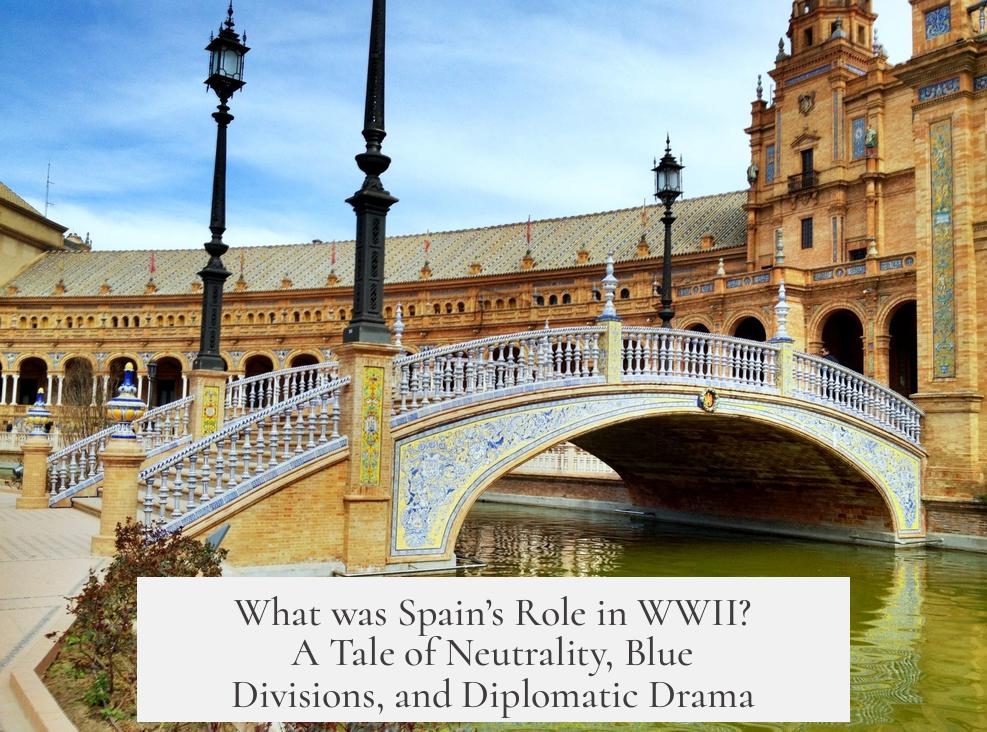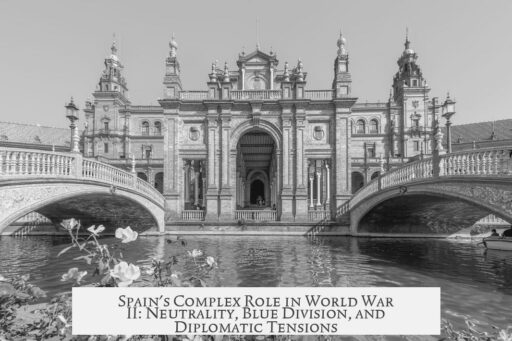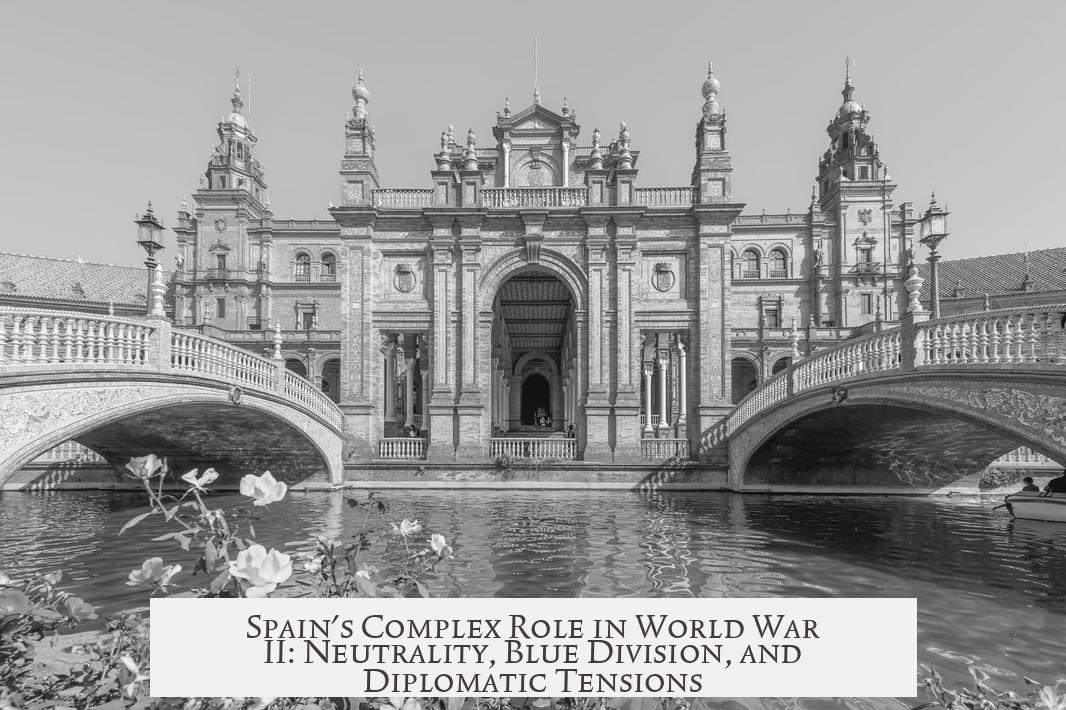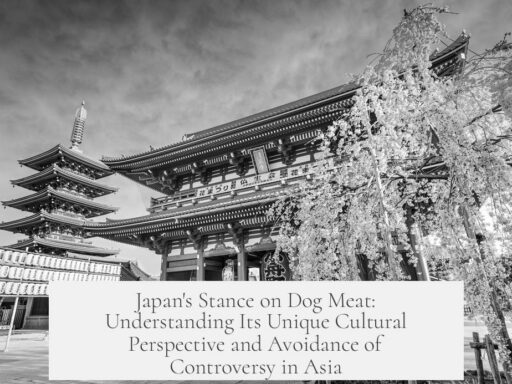Spain’s role in World War II was officially neutral but leaned toward the Axis powers through political sympathy and selective cooperation. The country avoided formal war entry, influenced by its post-civil war fragility and strategic calculations under Francisco Franco’s regime.
Spain officially declared neutrality during World War II. However, this neutrality was nuanced by pro-Axis sympathies driven by Franco’s fascist-leaning government. Spain’s recent civil war (1936-1939) had devastated its economy and infrastructure, leaving it unprepared for another large-scale conflict. Although Franco admired Hitler and Mussolini, who provided crucial support during the civil war, Spain could not risk entering WWII outright due to internal weaknesses and international uncertainties.
Franco contemplated entering the war on the Axis side after France’s defeat in 1940. He made a formal offer to join Berlin, but with strict conditions, such as Britain’s defeat before Spain’s engagement. Hitler rejected these conditions, finding Franco’s demands unreasonable. At their single meeting in Hendaye in 1940, Franco asked for territories including Gibraltar and parts of French colonial Africa, requests Hitler found impractical and irritating. The personal relationship between the two leaders was reportedly unfriendly, hampering diplomatic progress.
Spain provided material support critical to the Axis war effort while maintaining official neutrality. The regime exported raw materials, notably tungsten, essential for wartime industry in Germany. Tungsten’s high value for armor-piercing ammunition and heavy industries made Spain vital despite its non-belligerent status. Additionally, Spain’s geographic position was strategically significant. German intelligence used Spanish territory as a base to monitor Allied naval actions in the Atlantic and the Strait of Gibraltar, a key maritime chokepoint.
Espionage thrived in Spain due to its ambiguous status. British intelligence used Spanish channels to transmit false information to Axis forces, particularly in Operation Mincemeat. This covert operation mimicked genuine data to mislead German military decisions, highlighting Spain’s complex role as a conduit for multiple intelligence agencies.
Spain’s military engagement was limited but notable. The creation of the Blue Division (División Azul) allowed Spanish volunteers to fight alongside the German Wehrmacht on the Eastern Front against the Soviet Union. Though composed of volunteers, the division operated under Spanish Army command. It earned distinction in combat, praised by Hitler for their bravery and resilience. The Blue Division’s service ended in 1944, coinciding with shifting war tides and international pressure on Spain to distance itself from the Axis.
| Aspect | Details |
|---|---|
| Official Position | Neutral but pro-Axis sympathies |
| Political Context | Post-civil war recovery, Franco’s fascist regime |
| Diplomatic Relations | Formal but strained negotiations with Hitler; no formal war entry |
| Material Support | Exported tungsten and raw materials; intelligence cooperation |
| Military Contribution | Blue Division on Eastern Front under German command |
| Espionage Role | Spanish territory as intelligence hub; involvement in deception operations |
Spain’s ambiguous WWII role balances on a tight line between neutrality and alliance. Although it never declared war nor fully joined the Axis, its material and military contributions, diplomatic interactions, and strategic geographic position made it a complex actor. Franco’s pragmatic decision to avoid full intervention stemmed from Spain’s weakened state from its civil war and unclear long-term benefits of engagement.
Spain’s role demonstrates how a nation can influence global conflict without direct combat participation. Its support in raw materials, espionage, and limited military engagements affected the war’s dynamics subtly. The Blue Division’s effectiveness on the Eastern Front contrasts with the country’s official policy of non-belligerence, reflecting Franco’s cautious but ideologically aligned approach.
- Spain remained officially neutral but showed pro-Axis leanings due to Franco’s regime and ideological ties.
- The recent civil war left Spain economically and militarily unfit for full involvement.
- Franco entertained joining the Axis but with impractical territorial demands, causing stalled negotiations with Hitler.
- Spanish exports of tungsten and use of territory for Axis intelligence aided the war without formal entry.
- The Blue Division represented Spain’s limited military participation, fighting alongside German forces in the Soviet Union.
- Spain’s ambiguous role allowed it to avoid direct conflict but remain an important non-belligerent player in WWII.
What was Spain’s Role in WWII? A Tale of Neutrality, Blue Divisions, and Diplomatic Drama

Spain’s role in World War II was officially neutral but unofficially tilted toward the Axis powers—think of it as sitting on the fence while peeking over cautiously. Franco’s regime, coming fresh from a brutal civil war, wasn’t eager to dive headfirst into another war, yet the ties with Nazi Germany and Fascist Italy ran deep. Let’s unpack this fascinating, complex stance that Spain played during those turbulent years.
After a devastating civil war from 1936 to 1939, Spain was in no shape to engage in another massive conflict. Francisco Franco had just seized power, with plenty of help from Hitler and Mussolini, who saw the Spanish Civil War as a test run for the greater global violence that was about to explode. Spain, battered and broken, opted officially for neutrality in WWII, but its sympathies leaned firmly toward the Axis camp.
Neutrality with a Pro-Axis Wink
Franco’s Spain wore the neutral badge but flashed an unofficial pro-Axis smile. The dictator admired Hitler and Mussolini but understood Spain’s limitations. The country’s economy and military were too crippled after the civil war to risk outright involvement. However, Franco’s government didn’t simply sit back and do nothing. Spain’s aid came in subtler forms that made a difference.
- Material support: Spain provided critical raw materials, especially tungsten, a key metal used in armaments and machinery. This made Spain an important resource supplier to the Axis war machine. Without it, German weapons production could have been more challenging.
- Espionage and stealth: Spain became a buzzing hive of spies. British intelligence cleverly manipulated the Spanish, leading them to inadvertently feed false information to Germany through Operation Mincemeat. Talk about turning neutrality into an intelligence goldmine!
- Strategic geography: Spain’s location meant the Axis could use Spanish territory as lookout points to monitor Allied naval traffic through the Atlantic Ocean and the critical Strait of Gibraltar. This vigilancia (surveillance) provided valuable intelligence for the Germans.
The Dramatic Meeting at Hendaye
One of the more entertaining episodes was Franco’s face-to-face meeting with Hitler at Hendaye in 1940. Here, Franco basically played hardball, demanding ludicrous rewards before committing Spain to the Axis.
He wanted Gibraltar—still British territory today—and chunks of French colonial territory in Africa. This negotiation quickly soured Hitler’s mood. He later joked that he’d rather have his teeth pulled than negotiate with Franco again. The relationship between the two leaders was frosty at best; they met once, and neither liked the other much. This bickering ensured Spain stayed out of formal war participation.
Spain’s Military Nod: The Blue Division
While Spain avoided official entry, it did send military volunteers, known as the Blue Division (División Azul), to fight alongside Germany against the Soviet Union on the Eastern Front. This infantry division had Spanish Army roots but disguised itself as volunteers to skirt the neutrality line.
The Blue Division earned a solid reputation in combat. They performed well under the command of Generals Agustín Muñoz Grandes and Emilio Esteban Infantes. Hitler even praised them, reportedly saying: “The Spaniards have never yielded an inch of ground. One can’t imagine more fearless fellows.” Yet, as the winds of war shifted, Spain withdrew the Blue Division in 1944, acknowledging the changing strategic landscape and Franco’s need to keep options open.
Spain’s Ambiguous But Influential Role

So, what does all this mean? Spain’s role in WWII is best described as non-belligerent and ambiguous: not quite neutral, yet not officially at war. The country positioned itself delicately, helping the Axis with strategic resources, intelligence hotspots, and military volunteers but stopped short of formal engagement.
Did this ambiguity benefit Spain? Absolutely. The country avoided war’s devastation and maintained diplomatic flexibility. Franco also played a careful game, making demands too high to meet and balancing between the Axis and Allies as the war evolved. Spain was like the quiet kid at the back of the class who had all the answers but preferred to stay unseen.
Lessons from Spain’s WWII Stance
- Political survival trumps ideology: Franco had ideological ties with fascist powers but prioritized Spain’s recovery and regime stability over clumsy involvement.
- Neutrality is never simple: The so-called neutral countries during WWII often engaged in shadow wars of espionage, diplomatic negotiations, and material support that shaped outcomes offstage.
- Geopolitics is a chess game: Spain leveraged its location and resources to stay relevant without becoming a battleground.
If you’re fascinated by WWII, Spain’s story is a reminder that history isn’t always black and white. Sometimes, it’s a rich gray area full of negotiation, ambition, and survival instincts.
Summary
Spain maintained official neutrality in WWII but leaned toward the Axis powers due to political and ideological sympathies. Franco’s regime, recovering from civil war woes, provided raw materials and allowed Axis intelligence operations on Spanish soil. It sent the Blue Division to fight the Soviets but never formally entered the war. The Hendaye talks showed Franco’s grand ambitions but also helped keep Spain out of total conflict. Spain’s WWII role is a study in cautious diplomacy, strategic calculation, and old-fashioned political gamesmanship.




